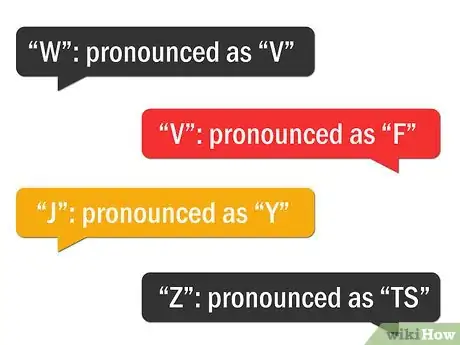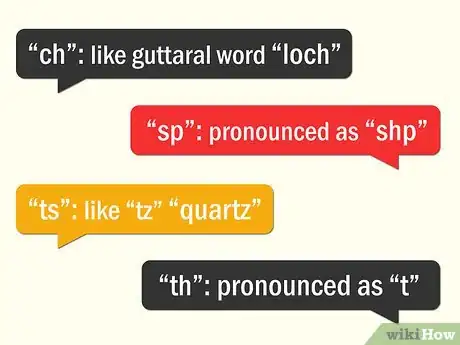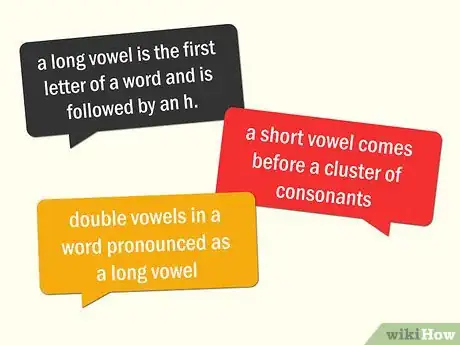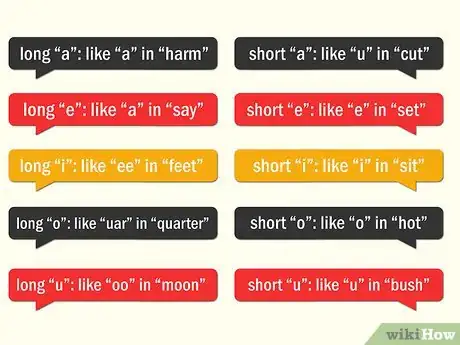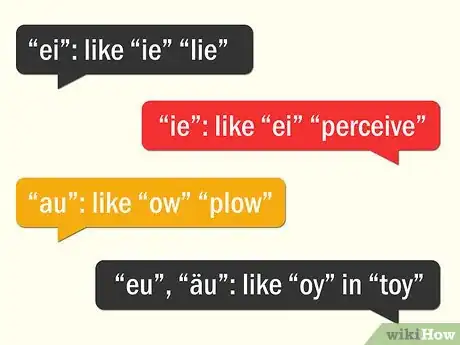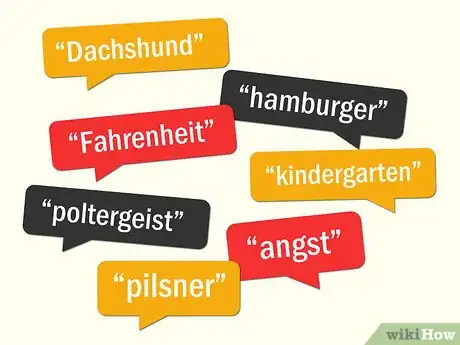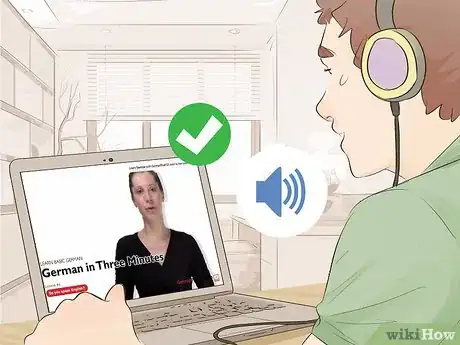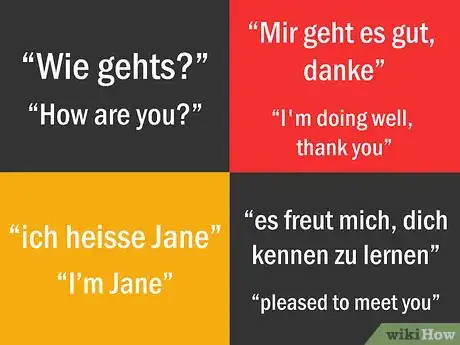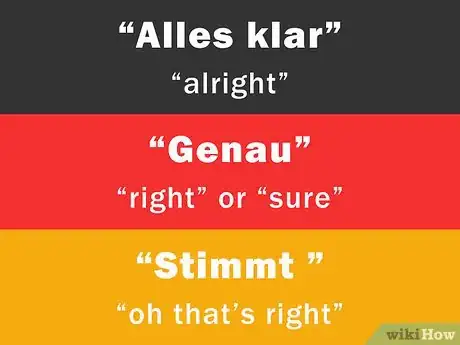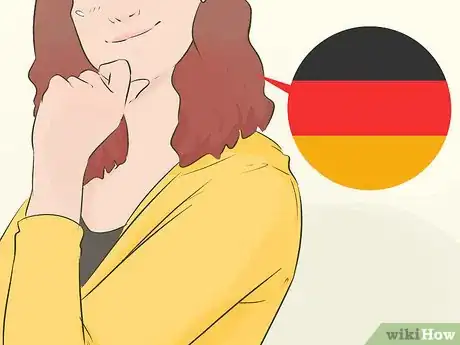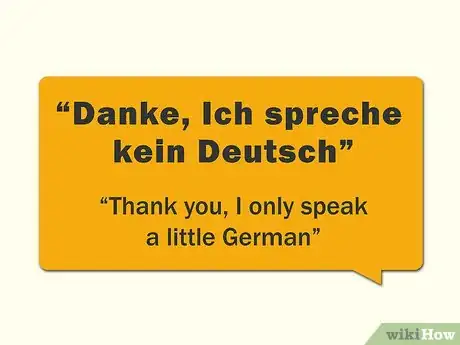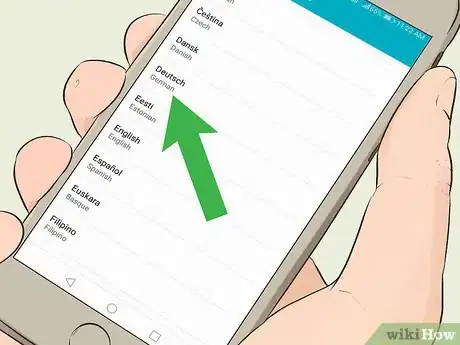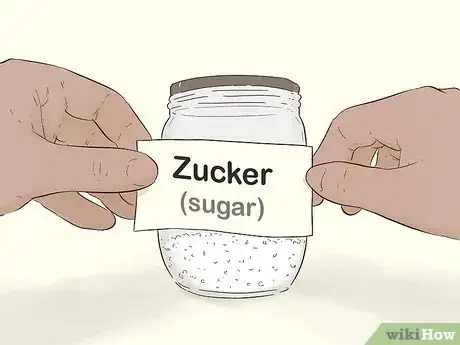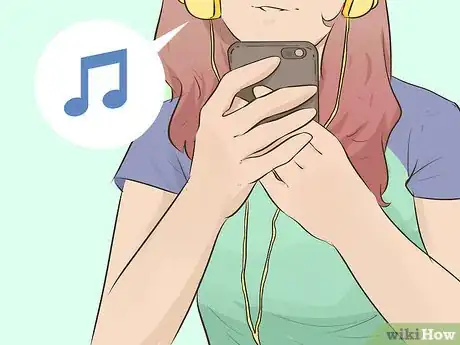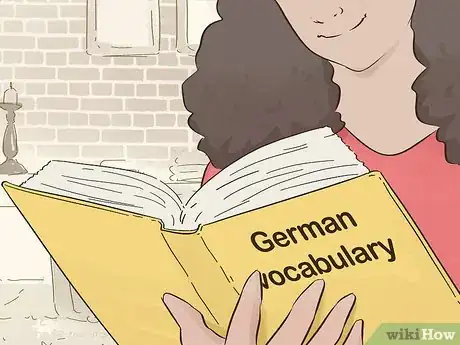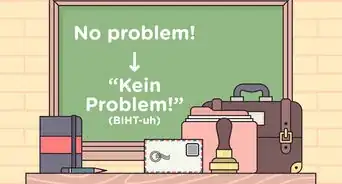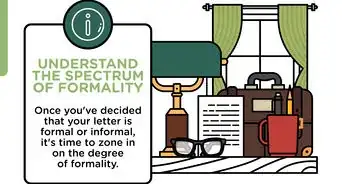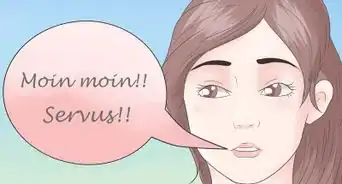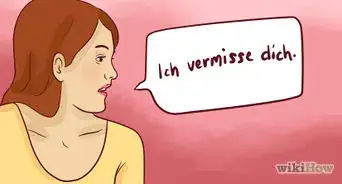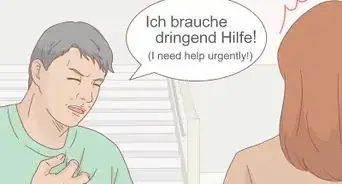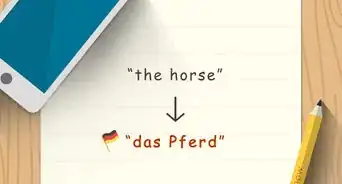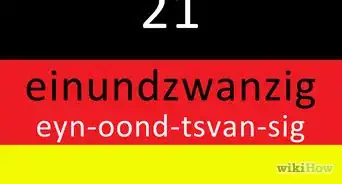This article was co-authored by Language Academia and by wikiHow staff writer, Jennifer Mueller, JD. Language Academia is a private, online language school founded by Kordilia Foxstone. Kordilia and her team specialize in teaching foreign languages and accent reduction. Language Academia offers courses in several languages, including English, Spanish, and Mandarin.
There are 18 references cited in this article, which can be found at the bottom of the page.
This article has been viewed 43,231 times.
When you think of German, you may likely think of Germany, and perhaps Austria. However, German is actually an official language in 7 countries and is the native language of more than 130 million people around the world.[1] If you want to learn how to speak German, focus first on pronunciation. Once you have the sounds down, you're ready to jump right into conversation. Don't worry about studying complex grammar rules – you can get to those later. Instead, think about how you learned your native language. You'll pick up more through immersion than you likely would through a textbook. Alles gute! (Good luck!)
Steps
Pronouncing the German Alphabet
-
1Start with consonants pronounced differently in German and English. The German alphabet is quite similar to the English alphabet. When you first start learning German, you'll likely see a lot of letters that you already know how to pronounce. However, there are some letters that Germans pronounce differently than their English-speaking counterparts.[2]
- The letter w in German is pronounced the same as the letter v in English.
- The letter v in German is pronounced the same as the letter f in English.
- The letter j in German is pronounced the same as the letter y in English. However, the j or hard g sound that exists in English is present in German. It is represented by the consonant cluster dsch, as in Dschungel, the German word for "jungle."[3]
- The letter z in German is pronounced the same as the letters ts in English.
Tip: German has one consonant that doesn't appear in English: the ß, pronounced like an ss in English – somewhat like a hissing sound. Although you'll still see this letter in German writing, many Germans are moving away from the ß character in favor of simply writing ss.
-
2Work on pronouncing two consonants together. German words often have two consonants side by side that look impossible to pronounce for an English speaker. To pronounce them, say the sound of each letter separately. Do not attempt to blend them together.[4]
- The letters ch represent a sound that doesn't exist in American English. It's similar to the Scottish guttural sound in words such as "loch." The ch sound found in the English word "check" is represented in German by the consonant cluster tsch. For example, the German name for the Czech Republic is Tsechechische Republik.
- The letters sp sound like shp. If you're familiar with the word spiel, which is a German word that has found its way into English, you know that it's actually pronounced "shpeel."
- Similar to sp, you add an h sound to the combination st as well to pronounce it sht. It sounds a bit like if you say the words "push to" without a pause between the words.
- If the letters ts appear next to each other in a German word, such as in the word tschüss (which means "goodbye), you pronounce it like the tz in the English word quartz.[5]
- The letters th typically only appear together in foreign words. Because there isn't an h sound in German like the h in English, th is simply pronounced like a t.[6]
Advertisement -
3Distinguish between short and long vowel sounds. As in English, German has both short and long vowels. Whether you pronounce a long or short vowel sound in a word depends roughly on the position of the vowel in the word and the consonants that surround it.[7]
- A vowel is long if it's the first letter of a word and is followed by an h.
- If a vowel comes before a cluster of consonants, it is short.
- If you see double vowels in a word, pronounce a long vowel.
-
4Learn to pronounce the basic German vowels correctly. Now that you know generally when a vowel will be long or short, you still need to know how to make those sounds. Most of the sounds of the basic German vowels are similar to vowel sounds you would make in English, although the letters that represent those sounds may be different.[8]
- The long A sound is similar to the a sound in the English word "harm."
- The short A sound is similar to the u sound in the English word "cut."
- The long E sound is similar to the a sound in the English word "say."
- The short E sound is similar to the e sound in the English word "set."
- The long I sound is similar to the ee sound in the English word "feet."
- The short I sound is similar to the i sound in the English word "sit."
- The long O sound is similar to the uar sound in the English word "quarter."
- The short O sound is similar to the o sound in the English word "hot."
- The long U sound is similar to the oo sound in the English word "moon."
- The short U sound is similar to the u sound in the English word "bush." However, you'll want to round your lips a little more than you would when speaking English to get the sound right.
-
5Practice unique German vowel sounds. Once you've got the short and long vowel sounds down, you're still not completely in the clear. There are a few vowels in German that have sounds that just don't exist in English. These vowels are indicated by the use of an umlaut, two small dots over the top of the letter. Like the basic vowels, they can also be long or short.[9]
- To make a long ö sound, keep your lips rounded and tense while making the u sound in the English word "burn." The short ö sound is the same sound as the long ö sound, it just isn't voiced as long.
- The long ü sound is a bit like the ew in the English word "pew," but more rounded. It's closer to the u sound in the French word une. The short ü sound is exactly the same as the long ü sound, it's just clipped.
- To make a long ä sound, try making a long A sound in English, as in the English word "say." Then open your mouth as wide as you can and stick your tongue out while continuing to make that sound. This is the sound you want to make for a long ä (although preferably without the extreme facial expression). A short ä sounds roughly like the e in the English word "get."
-
6Combine two vowel sounds into a single sound to pronounce diphthongs. Normally, if you see two vowels together in a German word, they are pronounced separately. However, there are a few combinations that blend together to create a new sound all their own.[10]
- The combination ei is pronounced like the ie in the English word "lie." Note that this is the exact opposite order of the same letters.
- The combination ie is pronounced like the ei in the English word "perceive." Like the ei combination, this is also the opposite order of the same letters to represent a similar sound.
- The combination au is pronounced like the ow in the English word "plow."
- The combinations eu and äu are pronounced like the oy in the English word "toy."
Tip: Unlike English, German doesn't really have any "silent" letters. Each letter is meant to be pronounced. If you see an e at the end of a German word, add an uh sound. A German cat is a Katze (KAHTS-uh) and the luxury German sports car brand is Porsche (POHR-schuh).
-
7Recognize German words that have made their way into English. English has a number of loan words that are originally German in origin. However, the original German words are often pronounced slightly different from their English counterparts. Now that you know how to pronounce German letters, look at those words that have made their way into English and try to pronounce them the German way.[11]
- For example, you're likely familiar with a Dachshund. In English, you probably pronounce the u with a short vowel sound similar to the word "hunt." However, in German, the dog breed's name is pronounced dahks-hoont. "Hund" is German for "dog" and a "Dachs" is a European badger, so the Dachshund is literally a "badger dog."
- Some other German loan words that appear in English include Fahrenheit, kindergarten, hamburger, poltergeist, angst, and pilsner.
Fun Fact: Although the word Fahrenheit is German in origin, modern Germany uses the Celsius temperature scale (along with the rest of Europe).
-
8Listen to Germans speaking and repeat what they say. Attempting to mimic native speakers is a great way to improve your own pronunciation. However, keep in mind that words may be pronounced slightly differently in different regions. Try to listen to Germans from the same general area so your pronunciation will be consistent.[12]
- If you're watching a video of native speakers, pay attention to the way their mouths move as they talk. Try to mimic that movement when you speak and notice how it changes your pronunciation.
- It can be a good idea to record yourself and listen back to how you sound. Naturally, most people don't like the way they sound on a recording, but no one has to hear it but you. Compare the pronunciation on your recording to the video or audio you have of native German speech.
-
9Practice your pronunciation in front of a mirror. The sound that comes out of your mouth has a lot to do with the position of your lips, how open your mouth is, and the position of your tongue. Speaking in front of a mirror can help you focus on moving your mouth differently to make unique German sounds.[13]
- For example, if you move your mouth when you speak German the same way you move it when you speak American English, you'll sound like an American speaking German. If you want to try to get rid of your foreign accent as much as possible when you speak German, you'll have to alter the way you move your mouth.
- Generally, Germans have more tension in their jaws when they speak, relative to speakers of English or Latin languages such as French and Spanish. Practice clinching your jaw and opening your lips only as much as necessary when you speak.
Having Natural Conversations
-
1Learn basic greetings and how to introduce yourself. The quickest way to learn German is to find someone who speaks the language and strike up a conversation. More formally, Germans would greet each other by saying Guten Tag! However, if you're just chatting with someone your own age, a simple hallo will suffice.[14]
- Follow up your hallo with Wie gehts? This means roughly "How are you?" If the other person asks first, respond with Mir geht es gut, danke and you've just said "I'm doing well, thank you" in German.
- Use ich heisse followed by your name to introduce yourself. More than likely, the person will tell you their name in return, at which point you can say es freut mich, dich kennen zu lernen, which means "pleased to meet you."
- If you want to carry on the conversation, ask the person questions that encourage them to talk about themselves or their own interests. Then you can jump in when you want to know more or have something to add. For example, you might ask them Was machst du beruflich? ("What do you do for work?") or Was machst du ausserhalb der Albeit? ("What do you do after work?")
-
2Pick up a few conversational placeholders and fillers. Think about the last conversation you had. It likely wasn't a series of questions and answers that played out like a script. Rather, it was probably filled with a lot of placeholder words such as "right," "sure," and "okay" to let your conversational partner know that you were listening and following along with what they had to say or that you agreed with them. Here are a few phrases you'll often hear native German speakers say:[15]
- Alles klar (literal translation "all clear") is the German equivalent of "alright" in English.
- Genau means "right" or "exactly" and is very common in native German speech. It's used similar to the way English speakers might pepper their conversations with "right" or "sure."
- Stimmt is a good response if someone's said something you agree with. It's typically used in situations where someone has reminded you of something you haven't thought of before, kind of like how you might say "Oh! That's right!" in English.
-
3Familiarize yourself with German slang to sound more natural. If you want to learn how to speak German, you likely want to learn the German that people today speak. Textbooks often teach you a more stilted, formal way of speaking. While that's fine and you'll still be understood, adding some slang will make for a more natural conversation.[16]
- If you've agreed upon something, such as a date to meet, you can say gebongt sein, which essentially means the thing has been decided. The verb bongen refers to ringing up a transaction on a cash register, so the phrase means the transaction (or future plan) has been settled.
- Was geht ab? is a more casual slang expression that essentially means "What's up?" If someone asks you this, respond with nicht viel ("not much") or alles gut ("everything's good").
- If a native German comes up to you and says Na? they're saying "hello" and asking after your well-being all in one short word. If you reply naaa it implies that you're doing okay.
Tip: If you're chatting with a native speaker who is using a lot of slang that you don't understand, you can always say Ich verstehe nicht ("I don't understand") and ask them for an explanation.
-
4Focus on topics that interest you in German. If you've ever taken a German course or used a language app, you might've felt that you were learning words and phrases you would never use in real life. If you study topics you're already interested in, you'll be able to have relatively fluent conversations about those topics.[17]
- For example, if you enjoy watching soccer, you're in luck, because Germans love soccer. Look for Bundesliga games in German – if you can't find them on your favorite streaming service or through your cable provider, you may be able to find them streaming online.
-
5Build the confidence to make mistakes with grace. Making mistakes is a good way to learn, but if you're afraid of making mistakes you may never even try. Remember that you are just learning a new language and no one expects you to become fluent overnight. If a German speaker corrects your speech, thank them and repeat back what they've said.[18]
- For example, you might say Danke, Ich spreche ein bischen Deutsch, which means "Thank you, I only speak a little German."
Immersing Yourself in German
-
1Switch the language on your electronic devices to German. One easy way to immerse yourself in German is to change the default language on your computer, smartphone, or tablet. Even though you'll only see a few words this way, it can still get you used to thinking in German.[19]
- You can also change the default language on some apps and websites, including social media apps. While doing this won't necessarily change posts into German, it will change the menu and messages from the app into German.
Tip: If you're a gamer, try playing one of your favorite games with the language switched to German. This is a good way to immerse yourself as well as actively participate.
-
2Label objects in your home with German words. Take sticky notes and write down the name of a few objects around your house. Start with 5 to 10 larger, more common objects. Once you've got those words memorized, you can label different objects. The goal is that after a while, you'll stop thinking of the object as the English word and instead think first of the German word. Here are some basic furniture words to get you started:[20]
- Couch/sofa: das Sofa
- Chair: der Stuhl
- Nightstand: der Nachttishe
- Dresser: die Kommode
- Bed: das Bett
- Table: der Tisch
- Bookcase: das Bücherregal
Tip: All German nouns have a gender. Including the article along with the word for the object will help you intuitively learn the gender of nouns. Also, note that all German nouns are capitalized.
-
3Listen to German music. German music goes far beyond the traditional folk music (called Volkmusik in German). German artists record and perform in most of the popular genres, so you're sure to find a German artist that you enjoy. Just listening to German music in the background while you're studying or doing chores can help your brain absorb the language.[21]
- To find German music you like, go to YouTube and search for "German" with the name of a genre. You'll find some videos to get you started.
- Electronic music is popular in Germany, but there are also many popular German rappers and hip hop artists. Even if you're not that into rap, listening to a German rapper will teach you a lot of German slang. It's worth noting that German rap is typically a lot tamer than American rap.
-
4Watch German movies without subtitles. You won't be able to speak German well if you keep trying to translate it into English or another language. There are many ideas and words in German that simply don't translate into any other language. When watching a movie, you can pick up meaning from the context in which the words are said.[22]
- Film dialogue also typically mimics a natural conversation, so you can get a sense for the rhythm of the language and the way Germans communicate with each other.
Tip: Start with a movie that you already know and have watched several times. That way you'll understand the context better and have a general idea of what the characters are going to say before they say it. This can help you pick up a lot more words.
-
5Stream German television shows. You can find German television streaming online as well as on your favorite streaming service. News shows are good because they typically talk about current events you may already be familiar with. Reality shows or game shows can also be good, because of their unscripted format.[23]
- If you're just beginning to learn German, try Nachrichtenleicht (https://www.nachrichtenleicht.de/), a site designed for language learners. Articles are written in simple German, and each article includes a podcast so you can listen to the article being read by a native speaker.
- Der Spiegel (https://www.spiegel.de/) and Deutsche Welle (https://www.dw.com/de/themen/s-9077) are major news sources in Germany. Although the language can be more complex, you'll also find photos and videos that can help with your comprehension. Deutsche Welle also has a section specifically geared towards language learners at https://www.dw.com/de/deutsch-lernen/s-2055.
-
6Approach German vocabulary logically. While long German words may seem intimidating, they have an inherent logic. Many of these long words are combinations of smaller words. The last word in the combination tells you the larger category of which that word is a part. The first part of the word defines the subset of that category that the word specifically applies to.[24]
- For example, in English, you would use two words – "dining room" – to refer to the room in your house that you eat in. In German, you use one word – Esszimmer – which is made up of the verb ess, which means "to eat," and the noun zimmer, which means "room." Quite literally, it is the room where you eat. Likewise, the word for "bedroom" in German is Schlafzimmer (literally, "sleep room").[25]
- That first part can also be an adjective or an adverb. For example, if you purchased illicit or unlicensed goods on the Schwarzmarkt (black market), you might worry about getting caught by the Staatspolizei (state police).
- You can also add a prefix to a noun to describe or intensify it. For example, if you add ober (which means "over") to a noun, it generally indicates that the noun is extreme or over the top. So oberpeinlich means "extremely embarrassing."
Community Q&A
-
QuestionHow to say "Shane" in German?
 Community AnswerShane is a name that is the same in both German and English. It is pronounced the same way in either language.
Community AnswerShane is a name that is the same in both German and English. It is pronounced the same way in either language. -
QuestionHow do you say Shyanne in German?
 TorpiTop AnswererShyanne/Cheyanne is one of the many names which is does not have separate English and German versions (a name which does, for example, is James, which is Hans in German). However, a German speaker who has never heard the English or Sioux pronounciation might pronounce it "Shy-ahn-na" or "Chey-ahn-na", rather than "Shy-ann".
TorpiTop AnswererShyanne/Cheyanne is one of the many names which is does not have separate English and German versions (a name which does, for example, is James, which is Hans in German). However, a German speaker who has never heard the English or Sioux pronounciation might pronounce it "Shy-ahn-na" or "Chey-ahn-na", rather than "Shy-ann". -
QuestionHow do you say "all right" in German?
 TorpiTop Answerer"Klar" if you're using it as an affirmation, "klar" or "schon gut" if you're responding to direction (don't say either to your managers or seniors, as this is even more informal than "alright" is in English), or "alles gut" if you're saying that you're all right.
TorpiTop Answerer"Klar" if you're using it as an affirmation, "klar" or "schon gut" if you're responding to direction (don't say either to your managers or seniors, as this is even more informal than "alright" is in English), or "alles gut" if you're saying that you're all right.
References
- ↑ https://www.deutschland.de/en/topic/culture/the-german-language-surprising-facts-and-figures
- ↑ https://www.thegermanproject.com/german-lessons/german-pronunciation
- ↑ https://www.fluentu.com/blog/german/how-to-pronounce-german-words/
- ↑ https://www.fluentu.com/blog/german/how-to-pronounce-german-words/
- ↑ https://www.thegermanproject.com/german-lessons/german-pronunciation
- ↑ https://www.fluentu.com/blog/german/how-to-pronounce-german-words/
- ↑ https://www.fluentu.com/blog/german/german-vowels/
- ↑ https://www.fluentu.com/blog/german/german-vowels/
- ↑ https://www.fluentu.com/blog/german/german-vowels/
- ↑ https://www.fluentu.com/blog/german/learn-german-words-pronunciation-audio/
- ↑ http://joycep.myweb.port.ac.uk/pronounce/exangwor.html
- ↑ http://www.fluentu.com/german/blog/learn-german-words-pronunciation-audio/
- ↑ http://www.fluentu.com/german/blog/learn-german-words-pronunciation-audio/
- ↑ https://www.omniglot.com/language/phrases/german.php
- ↑ https://www.sprachcaffe.com/us/english/magazine-article/how-to-speak-german-like-a-native-2015-05-20.htm
- ↑ https://www.fluentu.com/blog/german/german-slang-phrases/
- ↑ https://www.fluentu.com/blog/german/how-to-speak-german-fluently/
- ↑ https://www.fluentu.com/blog/german/how-to-speak-german-fluently/
- ↑ https://www.fluentu.com/blog/foreign-language-immersion/
- ↑ https://ielanguages.com/german-house.html
- ↑ https://www.fluentu.com/blog/german/learn-german-with-music-songs/
- ↑ https://www.fluentu.com/blog/german/learn-german-with-movies-film/
- ↑ https://www.fluentu.com/blog/german/learn-german-tv-shows/
- ↑ https://www.dartmouth.edu/~deutsch/Grammatik/Wortbildung/Komposita.html
- ↑ http://www.germanveryeasy.com/rooms
About This Article
To speak German, start by learning basic words to build your vocabulary and practice pronunciation, like "bitte" and "danke" for "please" and "thank you." Then, work on learning longer phrases, such as "Es tut mir Leid" for "I'm sorry" and "Ich verstehe das nicht" for "I don't understand," so that you can take part in a basic conversation. Once you've learned a few key words and phrases, dig deeper into your studies by improving your pronunciation, building your vocabulary, and learning how to form correct sentence structures. You can also try using German language apps and watching German movies with the English subtitles on to learn conversational German and common slang words! For more tips on learning correct pronunciation, read on!
